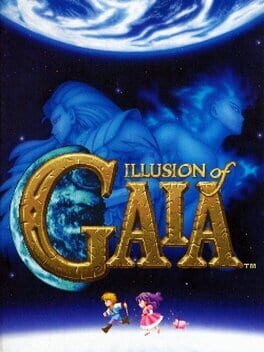

Journey into the dark side of an ancient civilization. Radiating an ominous light in its path, the Chaos Comet threatens the existence of the planet. Battles erupt and a tentative peace is returned to the lands. Danger lurks as the Chaos Comet orbits and dreadful beasts lie awaiting. In the Age of Exploration a boy named Will is born. Tragedy strikes during an expedition to the Tower of Babel separating Will from his father. Telekinetic forces awaken as Will returns to South Cape. Armed with his transformation abilities of two great warriors, Will must save the planet. Gaia, Will's guiding spirit bestows magical powers and advice along his journey. With the help of his friends Will must battle relentless enemies and solve the puzzles of the ancient ruins. Patience and knowledge are essential to reunite this father and son.
Reviews View More
Illusion of Gaia is the story of Temu, a young boy who lives in a coastal town and spends all day hanging out with his buddies. He's always had strange, telekinetic powers, but he's a kid like any other, and as soon as he's able, he's vowed to go out and find his father who disappeared a year ago when he left town to search for the Tower of Babel. After the kingdom's princess flees to his town and hides in his house, he and her become fast friends, and before they know it, the king has imprisoned Temu and they've all started onto a grand adventure to save the world.
In grand Enix fashion, I've heard many times over the years that this is a really poorly translated game in its English release. I've heard it described as outright nonsensical, even. The Japanese version, on the other hand, is actually a surprisingly really well written story. It's a really thoughtfully written tale about growing up, and I really loved how it tackled themes of discrimination (and while not perfect about it, it's a lot better than even a lot of games now get these sorts of things, frankly). Illusion of Gaia is a story very concerned about life, death, and just what you spend the one life you have doing. Life is never a completely pretty thing, and good people do bad things all the time for all sorts of reasons. What sort of life you lead and what you get from it, as well as what you do to others, is what paints this grand tapestry we call life. It's got some similar execution problems to Soul Blazer in how it doesn't always use music as well as it could to set certain scenes, but the story was nonetheless a really excellent one, and it's easily one of my new favorites on the console. It's just a shame it's nowhere remotely as good in the English release ^^;
The gameplay is once again a sort of Zelda-like, but with generally stiffer feeling combat as well as a transformation gimmick. Temu can turn into the dark warrior Freedan at save points in dungeons (and even another transformation much later into the game), and the respective powers of the different transformations are used to solve puzzles in dungeons. The boss and puzzle design isn't quite up to par with something like Link to the Past or other 2D Zelda games, but it still makes for a quite fun action game even if the adventure parts are more centered around the story writing than the exploration in towns and dungeons.
Speaking of which, there are significantly more towns in this game than in the last one, but they're largely for painting scenery and for telling the story. This is still a game with no money system, and you also don't level up with EXP like you did in Soul Blazer. Instead, clearing all of the monsters in a room gets you an upgrade to your max health, your attack power, or your defense power, so there's a hard limit to how great your stats can get in this game. There being no money also means that there's a hard limit to how many healing items you can get, and I've heard many a tale of how important it is to save your healing herbs in the English version to be able to deal with the harder bosses (which are MUCH harder in that version than in this one). The Japanese version, at least, had quite a nice difficulty curve to it, and while it's a bit harder than Soul Blazer and has no option to grind for power (though you can grind for extra lives, for whatever that's worth), this version should be eminently completable, especially for people familiar with the genre.
The presentation here is once again very good. The graphics are very pretty, and each location looks very distinct. NPCs and monsters are also very expressive and cool looking respectively, and the UI on top of the screen that shows monster and boss health is super appreciated for a game like this. While the UI design may've moved on from just copying Actraiser, the quality of the music is thankfully still just as strong as ever, and Illusion of Gaia has a soundtrack very befitting of its legacy.
Verdict: Highly Recommended. At least for the Japanese version, this is a game I can't recommend enough. It's a real shame that the English version is so much poorer, because it's honestly one of the strongest games on the system when it's actually written the way it's supposed to be. The action may not be the strongest on the system, but the story more than makes up for that (despite the imperfections and casual racism ^^; ), and this is absolutely a game worth checking out for action/adventure and 2D Zelda fans.
